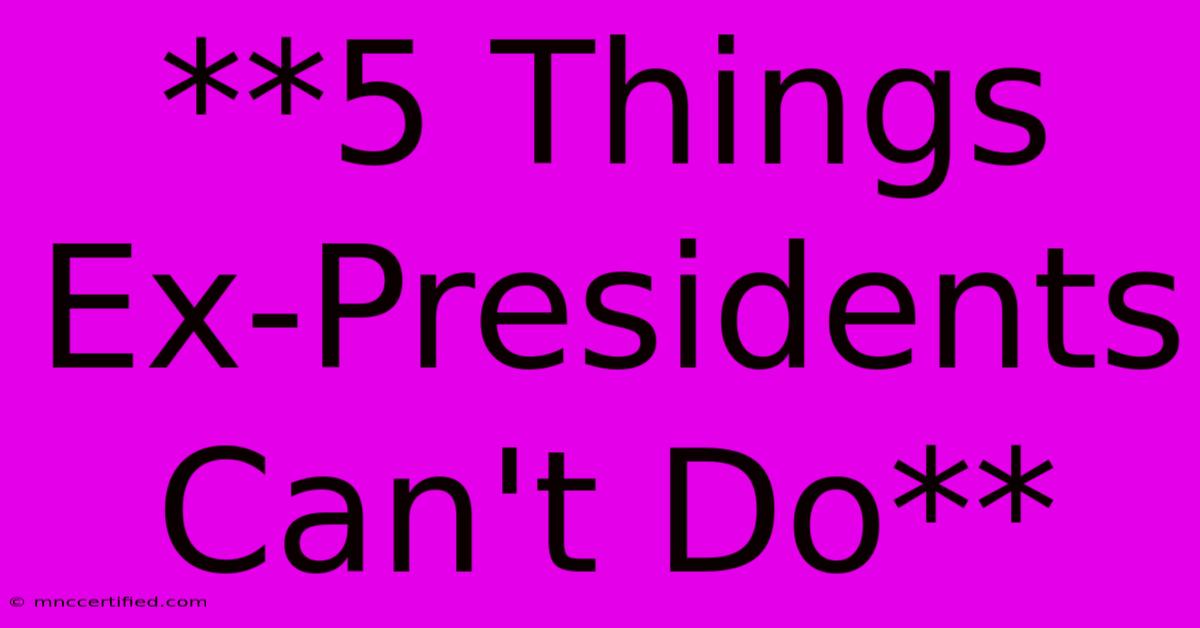**5 Things Ex-Presidents Can't Do**

Table of Contents
5 Things Ex-Presidents Can't Do: A Look Beyond the White House
The Oval Office is a place of power, prestige, and, for some, a lifelong dream. But what happens when the curtain falls on a presidency? What rules and restrictions govern the lives of former Commanders-in-Chief? While they may be out of office, their actions still have an impact, and there are certain things they are legally barred from doing.
Here are five things ex-presidents can't do:
1. Hold Another Elected Office (Most of the Time)
The 22nd Amendment to the US Constitution limits a president to two terms in office. While this doesn't prevent them from holding other elected positions, it does mean they can't run for president again. There's a loophole, however: if an individual served less than two full terms as president due to succeeding to the office (like in the case of Lyndon B. Johnson), they are eligible to be elected president for two more terms.
2. Directly Lobby the Government
Former presidents, just like any citizen, can express their opinions on political issues. However, they are barred from lobbying the government directly. This restriction aims to prevent former presidents from using their influence and connections for personal gain or to benefit specific companies or organizations.
3. Receive Classified Information Without Authorization
Access to classified information is a privilege reserved for those with a need to know. Ex-presidents, even if they were privy to top-secret material during their presidency, are not automatically granted access to such information after leaving office. They can only access classified material with authorization from the current administration.
4. Receive a Pension from the U.S. Government
While ex-presidents receive a lifetime pension, it's not actually paid by the federal government. Instead, they receive a $208,000 annual pension from the Presidential and Federal Employees Retirement System (PFEERS). This system is funded by contributions from their salaries while in office.
5. Use Presidential Perks for Personal Gain
Ex-presidents are granted certain benefits and perks, such as a lifetime Secret Service detail and office space. However, these perks are intended for the benefit of the public and cannot be used for personal gain. They must adhere to ethical guidelines and avoid using their former position for personal financial advantage.
Beyond these legal restrictions, there are also ethical considerations that ex-presidents must navigate:
- Avoiding Conflicts of Interest: They must be mindful of potential conflicts of interest when engaging in business ventures or other activities that could benefit from their former position.
- Maintaining Dignity and Integrity: Ex-presidents are expected to maintain a certain level of dignity and integrity, reflecting the high office they once held.
Ultimately, the lives of former presidents are a delicate balance between enjoying the freedoms of private citizens and respecting the responsibilities associated with their past service. While they may be out of the spotlight, their influence and impact on the nation's political landscape continue.
Keywords: ex-president, president, 22nd Amendment, lobbying, classified information, pension, perks, ethics, conflicts of interest, influence, political landscape, Oval Office, White House, Presidential and Federal Employees Retirement System (PFEERS)

Thank you for visiting our website wich cover about **5 Things Ex-Presidents Can't Do**. We hope the information provided has been useful to you. Feel free to contact us if you have any questions or need further assistance. See you next time and dont miss to bookmark.
Featured Posts
-
Bizarre Twist Bayern Munichs Champions League Opener
Nov 07, 2024
-
Memecoins Outperform As Trump Wins Election
Nov 07, 2024
-
Viral Video Gary Barlows Tall Son
Nov 07, 2024
-
Bof A Airline Stocks Outperform S And P 500
Nov 07, 2024
-
Trump Win Musk And Big Money Benefit
Nov 07, 2024